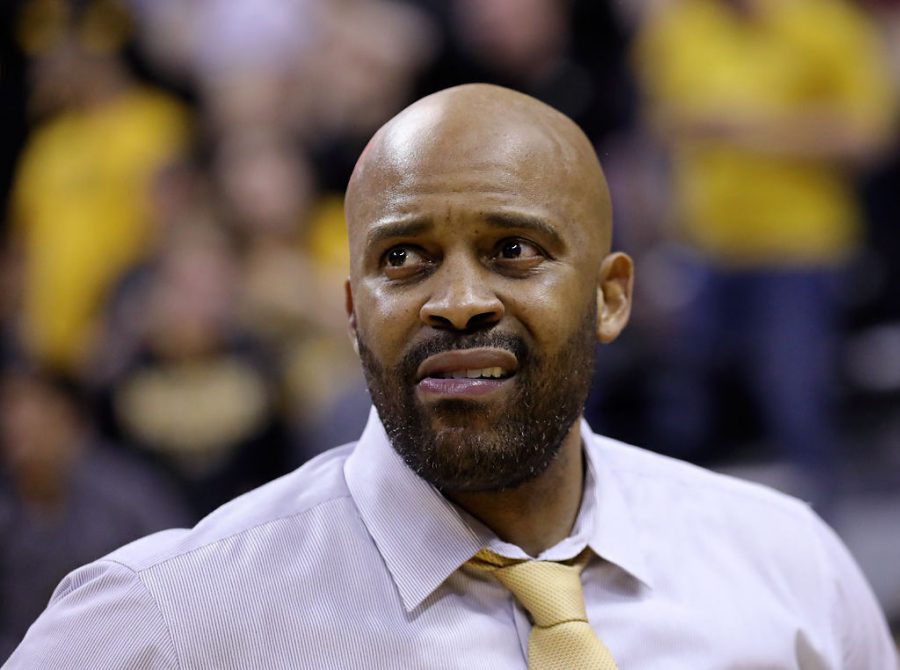Is the Tigers’ cold conclusion enough to put Martin in the hot seat?
March 28, 2021
Many Missouri fans have had a similar vision for Missouri coach Cuonzo Martin over the past month.
If it was up to them, Martin would be shipped to the middle of Montana in a man-sized box, far away from Norm Stewart Court, in order to ensure he never oversees another MU basketball game again.
But it isn’t that simple.
The head coaching job for the Tigers perhaps isn’t the most attractive in the land. The Mike Krzyzewskis and John Caliparis of the world aren’t going to clean their desks and book trips to Columbia.
Martin is a fine fit for the program. His interesting time at Missouri and this season particularly aren’t necessarily reasons for him to be on the hot seat.
Entering his fourth season in Columbia, Martin’s group — a band of average to above-average experienced upperclassmen — was picked to finish 10th in the Southeastern Conference in preseason polls. MU endured several injury-ridden, below-.500 campaigns in the two seasons prior.
Even with a chance for the returning group to be healthy, the expectations were minimal for a team missing next-level talent. Tigers fans were conditioned for below-average Southeastern Conference basketball.
But in a unique year that saw empty crowds and strange pandemic protocols, experienced teams seemingly had an advantage to begin the season. Missouri became the face of the movement. The Tigers enjoyed just over two months of great, poll-shifting basketball that included three wins over top-10 teams and an eventual top-10 ranking.
Before the season, it would’ve been a tough time trying to convince Missouri fans that the team would finish with as many ranked wins as it did. The Tigers’ peak this season and the stretch where they appeared as a surprise juggernaut in the SEC are testaments to how well a defensive-minded team can play under Martin.
But it was the final stretch they played that raised concern for the team.
Following its win over Alabama, MU dropped seven of its last 10 games. After not allowing an opponent to score 80 or more points in regulation through the first 12 games, the Tigers’ defensive identity began to disband. They allowed it five times after.
It was an abysmal and uncharacteristic stretch of hoops, especially with the high expectations fans had set for the team to that point.
It was a familiar feeling for Tigers fans over the past decade, though. Fans can even point to similar disappointments during earlier stages of Martin’s tenure. Even during his first season, when he acquired MU’s best recruiting class in program history, the season didn’t pan out how fans expected.
The start of the Martin era was supposed to be revitalizing with the addition of the Porter brothers among other elite recruits. It’s hard to meet expectations when Michael Porter Jr. — the nation’s No. 1 prospect — played a total of 53 minutes all year because of injury.
But it was Martin who made the necessary hire of Michael Porter Sr. to ensure that he had a fighting chance at the Porters, which included Jr.’s younger brother Jontay. It was Martin who still ensured a fourth-place finish in the league with his veteran squad and a couple of solid freshmen.
This season, it was Martin who helped his team get out to one of the best starts in Division I. All of the early upsets and monumental wins were a culmination of the foundation he created. He drilled defense into his players’ heads, and it helped the Tigers overachieve until teams caught on and their identity collapsed.
His final moments on the sideline during the Oklahoma loss weren’t pretty. His decision to sit Xavier Pinson — one of the Tigers’ best scorers — for the final 5:52 of the game while their season was on the line has loomed as his most questionable decision all season.
His choice to instead play Drew Buggs for defense and order has become an enigma to some. Martin ultimately chose to live and die by his defensive philosophy.
Despite decisions like that, Martin can’t take complete credit for Missouri’s eyesore of an offense this season. With no NBA-level talent on that side of the ball, the team was forced to follow his philosophy and let its defense create the offense. When that no longer worked, the team looked like a shell of itself.
Martin did what he could with the cards he was dealt. His system turned Dru Smith into a high-major star, one of the most reliable defenders in the country and an All-SEC first-team selection. Under his staff’s direction, Jeremiah Tilmon became one of the league’s best big men.
With much of his team likely moving on (if not in the portal already), this upcoming season marks a fresh slate for Martin. The culture he’s created has allowed for his best recruiting class since the one he began with. A class headlined by four-star guard Anton Brookshire looks to be the beginning of a new era in Columbia.
Losses like Pinson and Mark Smith to the transfer portal haven’t bothered Martin, as he’s already spent time in the portal himself. The Tigers snagged their first offseason commitment in Green Bay transfer Amari Davis on Thursday. Davis is just the beginning, as the portal has become monstrous and a handful of names have already shown interest in Missouri.
Even if his season finished in a flurry, the glimpse of potential and a peek at a bright future should be enough to at least earn Martin another season in his position. This offseason and the upcoming season will be very telling for Martin’s camp. If he demonstrates even a whiff of success, perhaps it might be time for Missouri to solidify his stay with an extension.
Martin has genuinely developed a culture, and his résumé is one that former coach Kim Anderson could only have wished for.













